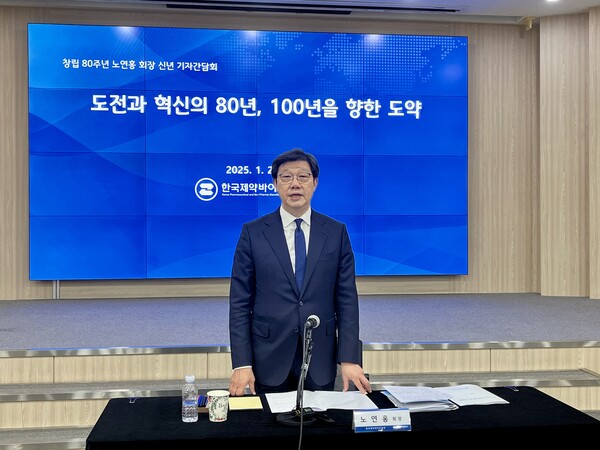In 2023, Korea’s pharmaceutical market exceeded 30 trillion won ($20.8 billion) for the first time, cementing the nation’s status as a major player in drug development. Korea is now the third-largest holder of new drug pipelines worldwide, a milestone fueled by ambitious technology exports and regulatory successes in key markets, including the United States and Europe.
Korean pharmaceutical companies have expanded their global presence through strategic acquisitions and partnerships, while home-grown drugs are gaining traction abroad.
Yet, as the industry celebrates its achievements, it faces mounting challenges, including economic uncertainties and intensifying international competition.

At a press conference on Tuesday celebrating the 80th anniversary of the Korea Pharmaceutical and Bio-Pharma Manufacturers Association (KPBMA), President Noh Yun-hong reflected on the sector’s dual reality: pride in its progress and the pressing need to navigate an unpredictable future.
“We are living in a time of challenges and uncertainties,” Noh said, pointing to global protectionism, low domestic growth, and waning investor confidence.
Even so, Korea’s pharmaceutical and biotechnology industries are pushing forward. In 2023, pipelines nearly doubled from three years earlier, rising from 1,477 in 2020 to 2,917. R&D spending by listed companies rose 7.4 percent to 4.7 trillion won, and pharmaceutical exports approached $10 billion.
Under the banner “K-Pharma: A Healthy Future for Korea,” the KPBMA has outlined an ambitious roadmap.
These include increasing R&D investment to 15 percent of industry revenue and developing five blockbuster drugs with annual sales exceeding 1 trillion won. The aim is to grow overseas sales to comprise more than half of total industry revenue.
However, achieving these targets requires overcoming significant barriers. While Korea excels in generic drug production, it still lags behind global leaders like the United States in developing innovative new drugs.
Strict domestic price control policies, aimed at stabilizing healthcare costs, have constrained profitability, making international competition even more challenging. “Direct price comparisons with countries operating under entirely different healthcare models could destabilize a fragile system,” Noh warned.
In response, the KPBMA has introduced measures to strengthen the industry. Over the past year, it launched a dual pricing system for rebates, expanded support for domestic raw material production, and advanced AI-driven drug discovery through initiatives.
It is also betting big on AI, which Noh described as “the most powerful tool to close the gap with advanced pharmaceutical nations.”
To commemorate its 80th anniversary, the KPBMA plans to launch a digital history museum, publish a chronicle of its history, and host events such as the AI Pharma Korea Conference. These efforts aim to bolster public trust and highlight the industry’s contributions to Korea’s healthcare system.
“Korea is at a critical point,” Noh said. “Advancing manufacturing capabilities, ensuring a stable pharmaceutical supply chain, and fostering public trust through ethical management will be key to sustaining this growth.”
Related articles
- Pharma industry group head confident of 'hitting record sales' this year
- [Top 10 Healthcare News in 2024 ⑥] Pharma companies’ provision of economic benefit was put to broad daylight
- 'Korean biotech startups face tough road ahead without early investment'
- Drugmaker group steps up nurturing new AI drug-developing talents
- KPBMA head named to chair Korea's healthcare reform panel
- KPBMA launches digital history museum for pharmaceutical industry
- K-pharma will materialize a healthy future for Korea this year: KPBMA
- Unwavering R&D investment key to Korea's drug discovery leadership: KPBMA

